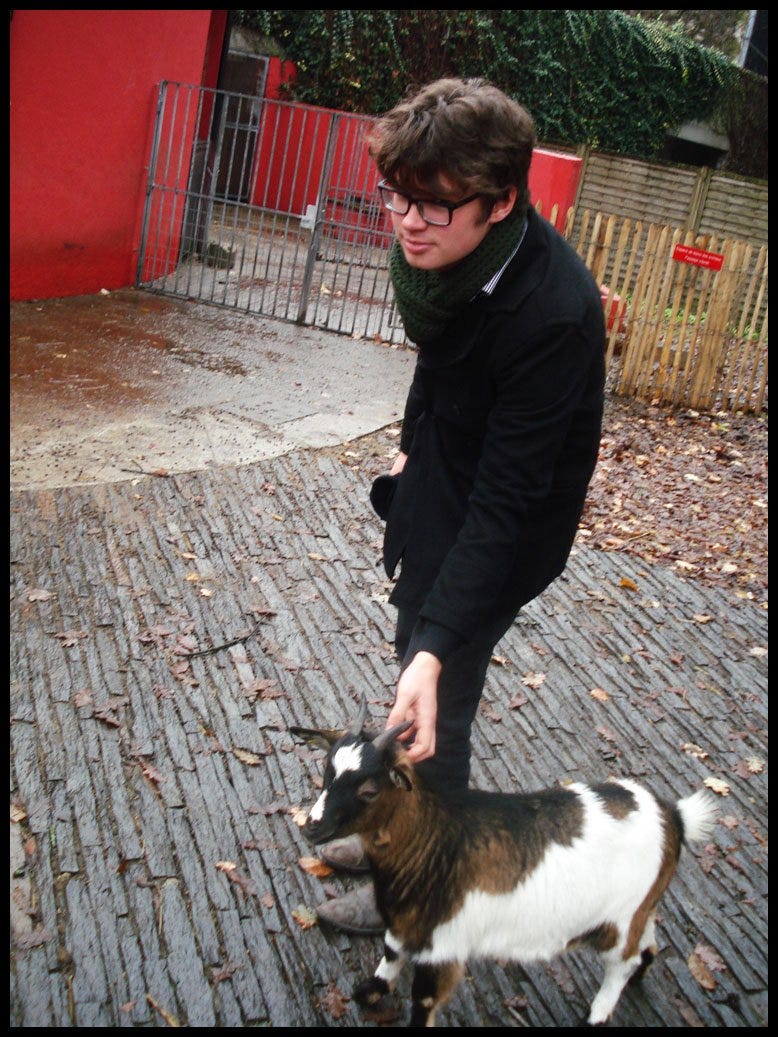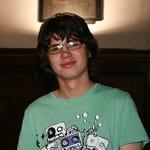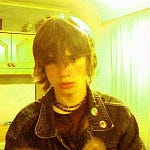Come hard through the fog
Blindfolded and bound
Slow down ‘Beautiful Gas Mask,’ at least buy me dinner first!
The sixth song on All Eternals Deck begins with an image that feels more explicit than anything the Mountain Goats had previously committed to record, though it’s worth noting a) that John Darnielle has commented ‘for the most part, people don’t know that I’m constantly walking around with filthy thoughts in my brain,’ and b) that his first tape, Taboo VI: The Homecoming, incorporated a sample from an audiobook about analingus. Now I’ve done my due diligence on that, though, I want to think more about how these lines are processed as a listening experience.
I used the term ‘image,’ and the lines do describe a scene the listener might visualise (preferably not while driving or operating heavy machinery). They register first of all, though, as an imperative, like those given in the first two songs on the album: ‘Scream when captured / Arch your back’; ‘Crawl through the tunnel and follow / Follow the light northwest.’ As in those moments, it’s unlikely the listener will immediately do as bidden - but being addressed so forcefully certainly makes you sit up and take notice. And as in those moments, not long afterwards something changes. In ‘Damn These Vampires,’ the pronouns switch, from ‘your back … your knuckles’ to ‘my hands and knees’; in ‘Birth of Serpents,’ the first person suddenly enters the frame - ‘remember you and me’ - and the images that follow, listing states where Darnielle has lived, from California to Oregon to Iowa, no longer feel like they’re supposed to apply to the song’s generic addressee. Here, the shift seems to take place on multiple levels:
'Til we stand at the edge
Of a hole in the ground
I don’t want to labour this point any more than necessary, but to go from being ‘blindfolded and bound’ to standing at the edge of a hole, presumably outdoors, seems to require quite a lot of physical movement - which also means rapidly reformulating our understanding of the opening phrase to the more neutral, day-to-day meaning of ‘coming … through’ something to a different location. And as the fog lifts, it reveals that we’re not alone - rather than the listener being the sole recipient of an ambiguous instruction, there are at least two people together, and the song’s ‘you’ is one of them, and immediately we’re off somewhere else: ‘We hold hands and we jump / And as we fall we sing.’ In the fourth verse, ‘you’ are gone altogether, ‘off in the shadows somewhere’ - by the fifth, ‘we’ are rising from our knees, possibly together again, possibly in separate locations.
What I’m tracking here is the strange way that listening to a song moves us through its world in real time: a situation Lloyd Cole wryly summarised in his couplet ‘Up eight flights of stairs to her basement flat / Pretty confused, huh? Being shipped around like that.’ But it’s also a strong example of a ‘very intentional poetic strategy’ Darnielle had been toying with for some time, adopting it wholesale by the time of this album, which Joel Heng Hartse asked the singer about directly on Twitter in 2021. Referring to the linguistic concept of the ‘pro-drop’ - ‘a sentence in which the pronoun is removed, such as “Going to the store”,’ where ‘the “I’m” is deleted/implied’ - Hartse proposed his ‘unscientific analysis… that this allows the actual speaker to be ambiguous - whether first or third person - potentially allowing listeners to identify with either.’
If anything, I’d say the second person is even more in play - but the effect, as Hartse suggests, is a kind of porous identification, like two slides overlaid. By the chorus, ‘Never sleep / Remember to breathe deep’ could be parsed as the singer’s note-to-self, or as something which addresses us, or as an instruction given to both at the same time. This is something I must have already started racking my brain about in 2011, since I wrote about it on a blog a year later in my first piece of really public writing about the Mountain Goats, and since I don’t think I’ve got any closer to an answer I’ll quote it as written:
“Time and again, Darnielle conjugates his verbs without a subject. We assume, in most cases rightly, that the person singing is the one performing the action, but take this verse from ‘How to Embrace A Swamp Creature’:
Meet up with you in the kitchen
Where the air is hot and dry
Open up all the faucets
Be fruitful and multiply
The first line is obviously the narrator’s action – [I, or I will] meet up with you in the kitchen. But does he also, alone, ‘open up all the faucets’? Or do they do it together – ‘we open up all the faucets’? Or is it an imperative, from the speaker to his addressee, that segues into the next line of Biblical command? And who’s that addressed to – her, himself, or us all?
A verse from ‘Genesis 3:23’ seems simpler in its grammar, but its function is similar:
Touch nothing move nothing stand still
Keep my ears open for cars
See how the people here live now
Hope they’re better at it than I was
The first line has that same inclusive, imperative presence – it puts us in the room with the dispossessed narrator, facing us with the same decision he has to make about his actions. The rest simply elides the subject, foregrounding not who is speaking, but what he is speaking about and doing – his actions. These come first, and narrative comes later; as well as keeping the song snappy and familiar, the lack of the first person pronoun creates a kind of universality, or to be pessimistic, perhaps an even greater dispossession. Like the elision of articles elsewhere, it gives us the actions in their raw form. But for the listener, this absence plunges us directly inside them, making the pull-back of the chorus even sharper – ‘I used to live here.’ We are so close to the verbs, we might be forgiven for briefly thinking that they only applied to us.”
This all feels like a very practical way of exploring some of the questions of reader-response theory which were part of Darnielle’s literary education: where does the text end and the reader begin? What is the artwork asking us to do, and what are we asking of it? One effect created, in any case, is something the Mountain Goats have long striven for, expressed here using different and more controlled means than the first-thought-best-thought, capture-the-lightning rawness of their early recordings: a feeling of intense immediacy which collapses the boundary between being at home listening and being in a room, in a moment, with a person experiencing something.
By All Eternals Deck, the Mountain Goats are an established full band, and confident enough to drive at that outcome in a variety of ways, including the elusive, mutating approach to narrative and image that carries the song between verses from the realms of the medieval - ‘Paupers hammering the walls of the castle’ - to those of sci-fi inflected modernity: ‘Crash in from deep space.’ Geoff Sanborn has written powerfully of how this mode works across the album, drawing on the ‘adhesive force’ which Richard Hugo (a writing tutor whose prompts Darnielle engaged with early on) suggested poets master. He encouraged them ‘to write, say, about a town not their own,’ picking a name off a map, ‘to let its vivid, mysterious details trigger associative movements elsewhere.’1 Sanborn identifies a quality of filmic montage in songs like ‘Damn These Vampires,’ where ‘cowboys on horses … are, at the same time, teenagers in a Trans Am.’
John has pushed against the idea that these kinds of associations are particularly conscious, calling ‘Beautiful Gas Mask’ itself ‘one of those fever visions where I would tell you what it was about if I had any idea.’ He’s referred more than once to the French critic Maurice Blanchot, ‘who argued that “the writer can’t ever understand what he’s writing … the entirety of the work isn’t visible to the writer. The writer can’t get to the work, and all he’s trying to do is reveal something to himself that he can never actually see.”’ But that opacity chimes with one of the latent themes set up by the album’s title, as laid out in the preface to the Biedermeier Jóskártya tarot deck which serves as one of its epigraphs: ‘Fortune-telling cards with their evocative yet enigmatic images are signposts on the path to the inner self.’ The ‘true fascination of cartomancy,’ it goes on, lies in how ‘it opens up a new approach to human understanding without prescribing literal conclusions.’
That approach might look like a ‘marriage of images and the personal stuff underneath them,’ as Darnielle described ‘Birth of Serpents.’ It’s one of many songs from this period that supports his own self-assessment that ‘my focus is mainly death scenes and downtown Portland,’ whether or not autobiographical details are there on the surface or whether the result feels more oblique and otherworldly, like the partially inscrutable ‘blurry pictures’ of ‘your darker moments’ which appear in the song itself, or like ‘emerging from a cave with glowing alien rocks we found hiding in a reflecting pool,’ as he wrote when announcing the album for pre-order. ‘Birth of Serpents’ itself seems to resolve the binary with a why not both?
For a long time, I found that shift in the chorus from identifiable geographic details to ‘the rooms with the heat lamps where the snakes get born’ to be intriguingly impenetrable, but a recent conversation with Lyric, a fellow contributor to a Mountain Goats-themed Discord server (whose live tapes you can find here) helped me find a new way of seeing it. Those rooms, though they might not sound initially much like the unforgettable ‘rooms like these’ about which Darnielle is reminiscing, shed light on the idea of how places might function as ‘an incubator for the person you become,’ where identity is formed under particular conditions of heat and pressure.
I wrote a couple of episodes ago about ‘Supergenesis,’ a song which explores how the serpent in the Garden of Eden got that way and its tenacious resistance to that apparent fate: ‘Try to hoist myself upright, again, try again.’ Later on All Eternals Deck, another Bible figure, Cain, gets the same treatment: haunted by the ‘prickings of my conscience,’ a political dissident in Pol Pot’s Cambodia invokes Abel’s killer as he reflects on why he ‘turned … in’ a comrade in order to ‘live to fight another day.’ An ancient narrative about guilt and shame maps onto one set in the 1970s, and further connects to Darnielle’s own recurrent themes of personal development and the circumstances that shape even our worst decisions.
Lyric also linked me to an article by Emma Stanford for The Toast which expertly captures how these kinds of sideways movements work more broadly. Describing ‘the breathing room carved out’ by Darnielle’s metaphors, Stanford writes:
He has a poet’s gift for injecting universal feelings into specific and alien narrative contexts, which allows you to catch your own emotional bogeymen by surprise. If you discover that his song about moon-colony organ harvesting is actually about how criminally lonely you felt the first time you made yourself throw up, the obliqueness of this association makes it possible to look almost directly, even almost compassionately, at something that three minutes ago you’d have given anything to disown.
John himself has often referenced this strategy of what we might call partial transference: glossing ‘Damn These Vampires,’ for instance, as about ‘being in the middle of something that you know you are going to have to finish walking through, like one of those people in the movies walking through a fire, only it’s not a movie, it's your actual life, and it really feels like real fire.’ The title of my chosen song today reflects this crossover between real life and mediated narratives. As John told Rob Delaney for Interview magazine, ‘Much of my life, I’ve struggled with this idea of whether I even had a “real” self—maybe I was just this long sequence of masks that I put on for various audiences.’
And it makes sense that the kind of memories and connections a writer feels ‘never quite free’ of will continue to pop up in their work, even if masked in various ways. Some of these recurrences are familiar cinematic touchstones like Universal Monsters and Judy Garland; the demo ‘Catherine Antrim’s Kid,’ released on a bonus cassette sent out with pre-orders of the album, is about the Old West outlaw Billy the Kid, whose ‘Dream of the Magic Shoes’ Darnielle first explored back in 1993, and who he has since resonantly described as ‘a guy who died when he was twenty-two,’ most likely ‘wishing he’d lived his life a little different.’
Elsewhere, the imagery of photography harks back to We Shall All Be Healed; ‘small chambers shrinking ‘til they vanish’ (in ‘Age of Kings’) seems to recast the many oppressive ‘small rooms that got even smaller’ of Darnielle’s earlier writing in a historical or mythic light, relocating a memory from the singer’s college days to a ‘stone tower in the foothills.’ Meanwhile, ‘High Hawk Season,’ ‘Prowl Great Cain’ and ‘Outer Scorpion Squadron’ all return to that key duality of leaving a mark ‘on any surface where the paint will stick’ or putting your faith in ‘a great wave of forgetfulness’: how memories can be drowned or rescued, burned or saved, be covered by the grass of the Soudoire Valley and then excavated by archaeologists thousands of years later, who will make their own judgements about killing and caring.
A ‘blanket curtain’ rigged between ‘the present and the past’ is far from an airlock. What happens when something moves behind it; when the surface ripples; when a hand reaches through? Here, the writing seems more overtly conscious of these questions as questions: it conjures up ghosts while asking if you really want to do so, calls attention to how ‘the picture flips’ regardless of how many times you might regrind the lens in an attempt to stop it - how the creation of image and narrative seems on some level to resist human control and agency.
Like Heretic Pride, All Eternals Deck revisits many of these longstanding obsessions in the manner of a compilation, without shoehorning them into too overt a theme (beyond a general governing mood of ambient dread.)
But the band, established as a trio for three years, has developed a ‘tight and organic’ sound through frequent touring, as Darnielle discussed with the Santa Barbara Independent on the album’s release, and as such the record seems to hold together even as the musicians push themselves in new and surprising directions. The singer told Pitchfork that ‘the way that you keep making music interesting is to not just do what you do. Some old school fans wish I was still yelling at people for the entire evening but, if I were to do that, everyone would lose interest, especially me.’
Accordingly, the album features a range of expressive and purposeful string arrangements courtesy of Yuval Semo, backing up both piano- and guitar-led songs, and one track, ‘High Hawk Season,’ which features vocal harmonies from the North Mountain Singers - unique for the Mountain Goats in some ways, but also reminiscent of John’s earliest backing band, the all-female Bright Mountain Choir. Perhaps this experiment itself paved the way for three deeply affecting gigs Darnielle would play with Anonymous 4, a quartet specialising in medieval polyphony, the following year.
All Eternals Deck was also recorded in four different studios - because ‘there’s excitement to a new room’ which ‘opens up your possibilities every time’ - including Mana, the Florida studio of Erik Rutan, a metal legend known for his work with Morbid Angel and Hate Eternal, whose productive channelling of anger had a big impact on Darnielle’s own thinking, as I’ve previously described. Darnielle in 2009 had noted feeling like on every album ‘I've got to turn it up at least once for people who can't stand it unless it's turned up,’ but the four songs tracked with Rutan wound up not being ‘barnburners,’ but compositions like the one with which this project started, ‘Soudoire Valley Song,’ that go to quiet places.2
There’s a throaty, gnarly quality to Peter Hughes’s bass sound on this record in which Rutan’s studio setup surely had a hand, but Jon Wurster didn’t avail himself of the full range of technical resources on offer. This session was apparently the first time that Rutan had ever ‘recorded a band that only needs one kick drum.’ Perhaps the most significant trace of Rutan’s approach on ‘Beautiful Gas Mask’ is the powerful hissing sound that runs through the track, especially prominent in the second half, which for a while I thought was a kind of drawn-out cymbal splash: as John explains it, ‘the electric guitar sound… is going through an ENGL Powerball, which is Erik's amp. We would never have thought to put my guitar through this gigantic powerful amp and then have me play it with my fingers real quiet. It's got this crackling, haunting presence in the background.’
Crackling, haunting presences in the background are as good a summary as any of what feels distinctive about the Mountain Goats’ seventh full studio album. Like the additional vocal take that comes in towards the end of the song - John yelling out phrases like ‘toxic shapes adorn the walls’ just under the surface of your initial perception - the amp hiss is an object lesson in how a mix can sustain a simmering intensity without the vocal, front and centre, gripping you around the throat. (Though if that’s something you’re missing, ‘Estate Sale Sign,’ you will always be famous.)
Describing why Portland is ‘a very strange place’ for him to revisit, John has commented that ‘I assume everybody in the world has a dark year.’ I’m sure I’ve had darker years personally than 2011, but I can’t think of any quite as dense with memory and incident, or any I’ve felt so drawn to return to in my own writing. From September 2010 to May 2011, I lived in Nantes, in the west of France, where I worked as an English-language teaching assistant in two schools in the city - giving conversation lessons no more than about ten hours a week, and ostensibly spending the rest of the time immersed in French culture. There were quite a few of us there doing the same thing, both British and American, and so in practice we actually spent most of our time together, getting drunk in each other’s apartments.
We might not have had all that much in common if we’d met in the course of our ordinary lives, but thrown together in these heightened circumstances we formed a tight-knit community, with all the friendship and romantic dramas that you might expect. I could write a novel about this year - and I sort of did, which is why you didn’t hear much from me in 2023, though don’t expect it to appear on the shelves any time soon: offers of representation very much welcome. (The Irish lit magazine An Capall Dorcha did publish the first chapter, which you can read on my university research page here, or buy online.) At the time, I was still gauche enough to keep a gossipy public blog about all of it. A decade on from the Wacko Weekly, I was dedicating column inches to scabrous satirical portraits of my friends and again, quite reasonably, some of them complained.
A recurring theme for me in returning to this stuff is that I don’t actually want to see it. Even though I could probably dig up the archived pages, dredge up the password to my old accounts… do you really want to conjure up a ghost? It’s enough to remember that these fragments of the past exist without actively pulling aside the blanket curtain, but the shadowy half-existence of this digital content seems different in quality from the slideshow of ‘blurry pictures’ through which a writer in 2011 might, say, recall the ‘lost age’ of nine all-consuming months spent far from home as a young man in the late 1980s. I’m not sure how I feel about that, but if I was, I probably wouldn’t be writing this.
2011 was, however, also the high point of the Facebook photo dump, and so much of this year is quite easy to trace even if I don’t engage with my textual record of it at the time. There’s the blackboard all my students signed at the end: did I really teach them anything? There’s my friend Celeste, who I haven’t spoken to in years, looking cold on the viewing platform of a large animatronic elephant that you could ride around the city’s refurbished shipyard. There’s the castle in Ancennis, and the empty bottles of Kronenbourg on my tiled floor, and the tiny desk that I wrote at furiously, and that umbrella I broke in the park, and the Irish bar, and the beach, and the bin strike - and the Tour de Bretagne, a chunky skyscraper which I could see clearly from my apartment on the sixth floor of a housing block in the first major city I’d ever lived in, with the trams going back and forth beneath me, rising up into the fuzzy pink sky.
And across the course of the year - when my teaching wages and student loan taken together meant I could afford extensive travel for the first time - there I am in front of Niagara Falls, in front of Leonard Cohen’s childhood home in Montreal, on the back of a camel in the Atlas Mountains of Morocco wearing what looks like a full suit with elbow patches. I came home in the summer before starting the final year of my undergrad degree, just in time to be involved in the production of a script which was, for a brief shining moment, on aggregate, the worst reviewed performance of the entire 2011 Edinburgh Fringe. Pretty confused, huh, being shipped around like that?
I’m sorely tempted to use the camel picture as the episode’s representative photo, but unless I crop it into pixelated oblivion, it would also serve as evidence of a formatively devastating situationship and although we’ve stayed friends, I’m not sure how to navigate the permissions on that one. And in any case, I think of 2011 as my year in France, not my two weeks in Morocco. So I’ll save it for the Instagram, and finish instead with a goat - as is fitting - which I’m bending down to stroke in their small pen in the Nantes Jardin de Plantes.
I’m wearing a sort of cable knit green scarf which, like all my scarves, I must have lost on the bus soon after - but I look happy, don’t I? Still a little skinny and awkward, sure, but maybe more confident than in the years preceding. For all the hysterical highs and lows, this was the first time in years that I’d been able to see myself, through the eyes of others, as desirable, as a worthy subject of romantic affection - and as in ‘Age of Kings,’ that feeling that I could hold someone in my arms and not feel pushed away brought me a little closer to a self I recognise. Somewhere in that ‘long sequence of masks’ which is any adolescence and young adulthood, I tell myself that I’m starting to see it: something a little closer, maybe, to my one true face.
This week, Richard is getting into guitar pedals. Turns out, they’re good!
Richard Hugo, The Triggering Town: Lectures and Essays on Poetry and Writing (New York: Norton, 1979). Thanks to Geoff for steering me towards this book, worth reading in full
‘Birth of Serpents,’ ‘The Autopsy Garland,’ ‘Beautiful Gas Mask,’ and ‘Soudoire Valley Song.’




![Peep Show Script в X: „Super Hans: What we really need to do is create a powerful sense of dread. [Holds down on one key on the keyboard.] See, the longer the Peep Show Script в X: „Super Hans: What we really need to do is create a powerful sense of dread. [Holds down on one key on the keyboard.] See, the longer the](https://substackcdn.com/image/fetch/$s_!LIQU!,w_1456,c_limit,f_auto,q_auto:good,fl_progressive:steep/https%3A%2F%2Fsubstack-post-media.s3.amazonaws.com%2Fpublic%2Fimages%2Fe88657b5-57bd-4d3d-bb5c-be0818cfe388_1200x800.jpeg)










Share this post